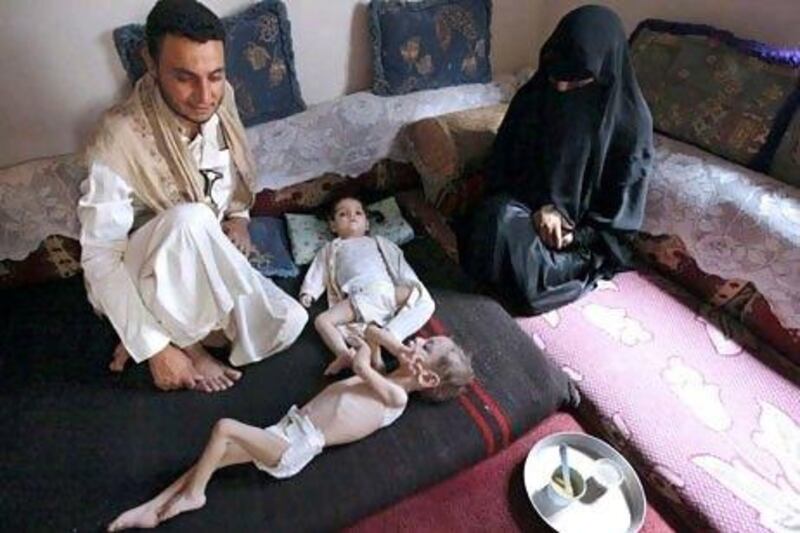SANAA // With her right hand spread open, Salma Al Humaiqani begs for survival.
For more than a year she has occupied street corners in Yemen’s capital, surrounded by her six children, the oldest 14, the youngest 6.
“We want to escape hunger. It’s either we beg or starve with no one to help or care for us,” said Ms Al Humaiqani, who is 40.
She is among the eight million people living in poverty in the poorest country in the Arabian peninsula.
The United Nations said Yemen's food and hunger crisis was one of the worst in the world and that the country after six wars since 2004 was on in the brink of disaster.
This month international donors pledged US$6.4 billion (Dh23.5bn) in aid, more than half coming from Saudi Arabia. The UAE contributed $136 million in food donations to Yemen during Ramadan.
“We require assistance in all forms,” Yemen’s foreign minister, Abubakre Al Qirbi, said this month.
So too, does Ms Al Humaiqani.
This was not always the case. Three years ago, after her husband was killed in a car accident, she sold everything they had. She took an office janitorial job, which paid US$100 a month, but she lost it during the economic crisis and was forced to pull her children from school to beg on the streets.
Sometimes she and her youngsters can make up to $7 a day. The average gift – 5 cents.
“Charities can only due so much. There are millions of us hungry and very little support,” she said.
Fifty-four per cent of Yemenis, according to government officials, live below the poverty line.
“More than 10 million Yemenis sleep and wake up in the morning without [knowing if] they will have food for the day,’’ said Ismail Ould Cheikh Ahmed, the UN resident coordinator for the country.
Local markets have food available, but prices have nearly doubled in the last year, the result of war and drought.
Ahmed Shamsan heads the children’s department at Sabeen Hospital in Sanaa. He said that 300,000 children were facing life-threatening levels of malnutrition and that 10 million people do not have enough to eat. “Both parents and children are starving. It’s a dangerous situation that will only get worse,” said Dr Shamsan.
The government-run hospital has the only specialist dealing with child malnutrition in the country.
“Many of the children who come to our facilities arrive late and will die. There are more cases than we can handle and hunger is expected to kill more than wars in Yemen,” he added.“The hunger crisis in Yemen is not something that will be solved soon. This is an issue that will affect the country for decades to come.”
He said 43 per cent of children under five in the country are moderately or severely underweight, and that about one million under-fives are acutely malnourished.
But isn’t just the young who are in trouble in Yemen.
Middle-class families in the country’s rural areas have been forced to leave their homes because of war or threats of war. They resorted to camps after losing everything they had. Insecurity is everywhere.
Abdullah Al Obairi was once a businessman who owned property and farms. The wars in Yemen’s northern province of Saada left him with nothing. He now lives with his family of five in a shelter camp in neighbouring Amran province. It has been home for more than a year.
Mr Al Obair said he was losing hope of a better life.
“When we first came here we thought it would be temporarily and that my family’s struggles was short term. We are starving now and dreams of seeing my children go to school are finished,” said Mr Al Obairi.
“People are dying from hunger. Today we need actions not words to help the most-suffering families,” said Ahmed Bahri, spokesperson for the opposition Joint Meeting Parties.
“The world must not forget Yemen when it is most in need. The world must help the poor and hungry children before its too late,” he said.
[ foreign, desk@thenational.ae ]





